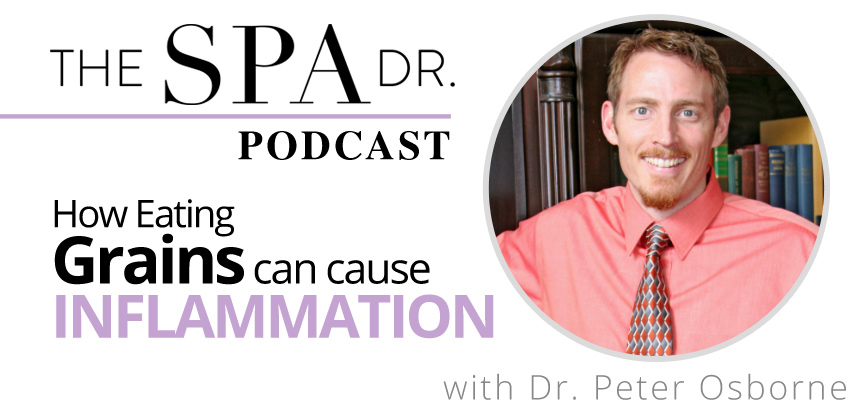Episodes

Tuesday Feb 02, 2016
How Eating Grains Can Cause Inflammation with Dr. Peter Osborne
Tuesday Feb 02, 2016
Tuesday Feb 02, 2016
Our guest today is Dr. Peter Osborne, a Board Certified Clinical Nutritionist and functional medicine practitioner. Dr. Osborne is the author of the book “No Grain, No Pain” (released January 26th), and is an expert in the science behind grain, gluten and inflammation.
In today’s podcast Dr. Osborne shares with us:
- Which grains besides gluten may trigger problems.
- The difference between going gluten free and grain free.
- The best foods to eat for maintaining a healthy lifestyle.
Want to learn about what foods should you be eating in order to maintain long-term health? Find out at the 32 minute mark.
Grainflammation
America has seen a dramatic increase in autoimmune diseases, and this is largely due to leaky gut. One of the causes of leaky gut is gluten. For those with gluten sensitivities, ingesting gluten can cause a “cascade of inflammation” that has a detrimental impact on overall health.
The average person with celiac disease will develop 7 autoimmune conditions in their lifetime.
Cutting out gluten often helps relieve a number of chronic conditions, including arthritis, muscle and joint pain, tendinitis, restless leg syndrome, psoriasis, and eczema.
Grain Free vs. Gluten Free
Most celiac disease sufferers “go gluten free” by cutting out wheat, barley, and rye from their diet. This does not always solve the problem of leaky gut, because there are other grains that also contain different kinds of gluten that have been shown to cause similar types of inflammatory responses in people with gluten sensitivities. Some of these grains include corn, rice, and millet.
Oats and Quinoa
Studies on oats are mixed, but some celiac disease sufferers do react to oats. Quinoa is a pseudo grain that can cause problems when consumed as a staple food.
Testing for Gluten Sensitivity
Dr. Osborne is a strong proponent of genetic testing for sensitivities, including gluten. He has developed a quiz to help people determine if they may want to consider genetic testing for gluten sensitivity. This quiz is available at Gluten Free Society.
Foods for Maintaining Long Term Health
There is no single diet plan that works for everyone, but in general terms Dr. Osborne recommends a diet that includes the following components:
- Adequate protein in the form of meat or vegetarian-based protein formulas. Dr. Osborne strongly recommends wild and wild-caught meats.
- Organic fresh fruits and vegetables
- Nuts
- Intermittent fasting: gives time for your gut to rest.
Links to Check Out
- Gluten Free Society
- No Grain No Pain: A 30-Day Diet for Eliminating the Root Cause of Chronic Pain
- Dr. Osborne’s Live Q& A Webinar
Dr. Peter Osborne
Dr. Osborne is the clinical director of Origins Healthcare Center in Sugar Land, TX. He is a doctor of chiropractic medicine, Board Certified Clinical Nutritionist and functional medicine practitioner. His clinical focus is the holistic natural treatment of chronic degenerative diseases with a primary focus on gluten sensitivity and food allergies. Over the past 15 years he has helped thousands of patients recover from mysterious medical illnesses. In 2010 Dr. Osborne founded the Gluten Free Society to help educate patients and physicians on the far-reaching effects of gluten sensitivity. He is the author of the book “No Grain, No Pain”.


No comments yet. Be the first to say something!